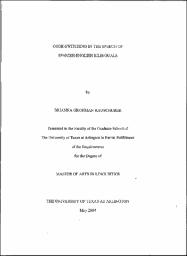
ATTENTION: The works hosted here are being migrated to a new repository that will consolidate resources, improve discoverability, and better show UTA's research impact on the global community. We will update authors as the migration progresses. Please see MavMatrix for more information.
Show simple item record
| dc.contributor.author | Rauschuber, Brianna Grohman | |
| dc.date.accessioned | 2020-10-07T20:47:46Z | |
| dc.date.available | 2020-10-07T20:47:46Z | |
| dc.date.issued | 2004-05 | |
| dc.identifier.uri | http://hdl.handle.net/10106/29474 | |
| dc.description.abstract | The purpose of this study is the investigation of (a) the motivations for code-switching; and (b) the process by which bilinguals perceive code-switching as meaningful. The empirical basis for the study is data gathered from Spanish-English bilinguals in the U.S. The results suggest that the motivations for code-switching and the conversational functions that code-switching often serves are the same. Speakers code-switch because doing so allows them to convey some meaning beyond the information contained in the proposition of an utterance. The author proposes that the communicative value of code-switching among balanced bilinguals can be explained in relation to Grice's (1975) cooperative principle. The cooperative principle is composed of five maxims, rather than the original four, which are: Quantity, Quality, Relation, Manner, and Mode. The maxim of Mode directs speakers to use a single linguistic code for any given social event, and to use the linguistic code that is most appropriate for the given social situation. | en_US |
| dc.language.iso | en_US | en_US |
| dc.publisher | University of Texas at Arlington | en_US |
| dc.subject | Language | |
| dc.subject | Literature and linguistics | |
| dc.title | CODE-SWITCHING IN THE SPEECH OF SPANISH-ENGLISH BILINGUALS | en_US |
| dc.type | Thesis | en_US |
| thesis.degree.department | Linguistics | |
| thesis.degree.name | Master of Arts in Linguistics | |
Files in this item
- Name:
- Code-Switching in the Speech of ...
- Size:
- 2.451Mb
- Format:
- PDF
- Description:
- PDF
This item appears in the following Collection(s)
Show simple item record


